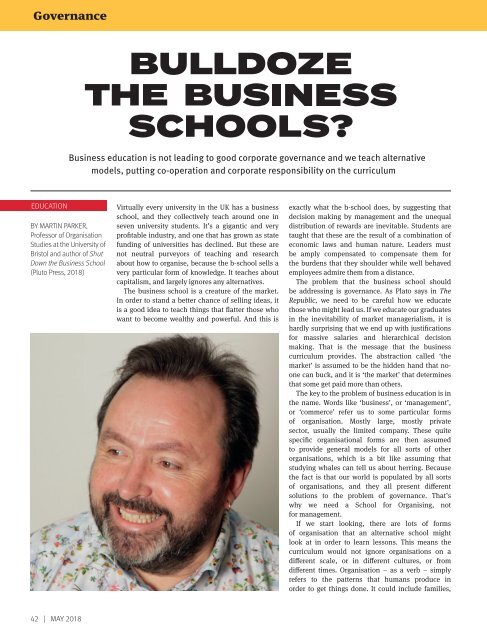MAY 2018
The May 2018 edition of Co-op News: connecting, challenging and championing the global co-operative movement. This issue shines a spotlight on governance – and how co-operatives do it differently. We also look at co-ops on the agenda in Westminster, sustainability supporting and preview some of the motions being put to the vote at the Co-op Group AGM.
The May 2018 edition of Co-op News: connecting, challenging and championing the global co-operative movement. This issue shines a spotlight on governance – and how co-operatives do it differently. We also look at co-ops on the agenda in Westminster, sustainability supporting and preview some of the motions being put to the vote at the Co-op Group AGM.
You also want an ePaper? Increase the reach of your titles
YUMPU automatically turns print PDFs into web optimized ePapers that Google loves.
Business education is not leading to good corporate governance and we teach alternative<br />
models, putting co-operation and corporate responsibility on the curriculum<br />
EDUCATION<br />
BY MARTIN PARKER,<br />
Professor of Organisation<br />
Studies at the University of<br />
Bristol and author of Shut<br />
Down the Business School<br />
(Pluto Press, <strong>2018</strong>)<br />
Virtually every university in the UK has a business<br />
school, and they collectively teach around one in<br />
seven university students. It’s a gigantic and very<br />
profitable industry, and one that has grown as state<br />
funding of universities has declined. But these are<br />
not neutral purveyors of teaching and research<br />
about how to organise, because the b-school sells a<br />
very particular form of knowledge. It teaches about<br />
capitalism, and largely ignores any alternatives.<br />
The business school is a creature of the market.<br />
In order to stand a better chance of selling ideas, it<br />
is a good idea to teach things that flatter those who<br />
want to become wealthy and powerful. And this is<br />
exactly what the b-school does, by suggesting that<br />
decision making by management and the unequal<br />
distribution of rewards are inevitable. Students are<br />
taught that these are the result of a combination of<br />
economic laws and human nature. Leaders must<br />
be amply compensated to compensate them for<br />
the burdens that they shoulder while well behaved<br />
employees admire them from a distance.<br />
The problem that the business school should<br />
be addressing is governance. As Plato says in The<br />
Republic, we need to be careful how we educate<br />
those who might lead us. If we educate our graduates<br />
in the inevitability of market managerialism, it is<br />
hardly surprising that we end up with justifications<br />
for massive salaries and hierarchical decision<br />
making. That is the message that the business<br />
curriculum provides. The abstraction called ‘the<br />
market’ is assumed to be the hidden hand that noone<br />
can buck, and it is ‘the market’ that determines<br />
that some get paid more than others.<br />
The key to the problem of business education is in<br />
the name. Words like ‘business’, or ‘management’,<br />
or ‘commerce’ refer us to some particular forms<br />
of organisation. Mostly large, mostly private<br />
sector, usually the limited company. These quite<br />
specific organisational forms are then assumed<br />
to provide general models for all sorts of other<br />
organisations, which is a bit like assuming that<br />
studying whales can tell us about herring. Because<br />
the fact is that our world is populated by all sorts<br />
of organisations, and they all present different<br />
solutions to the problem of governance. That’s<br />
why we need a School for Organising, not<br />
for management.<br />
If we start looking, there are lots of forms<br />
of organisation that an alternative school might<br />
look at in order to learn lessons. This means the<br />
curriculum would not ignore organisations on a<br />
different scale, or in different cultures, or from<br />
different times. Organisation – as a verb – simply<br />
refers to the patterns that humans produce in<br />
order to get things done. It could include families,<br />
42 | <strong>MAY</strong> <strong>2018</strong>


















